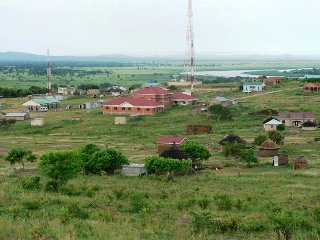S. Sudan lawyer challenges Nimule eviction order
March 4, 2013 (JUBA) – A lawyer representing 39 businessmen whose shops and hotels at South Sudan’s border town of Nimule could be demolished following a ministerial order has challenged the legality of the process.

Located in Magwi County of Eastern Equatoria State, is located about in 192km south-east of the South Sudan’s on the border with neighbouring Uganda.
However, William Kon Bior, a lawyer from the firm representing the complainants insists there is no legal ground for carrying out the eviction, if no compensation is made.
“I am writing on behalf of my clients to advice […] ministry of interior to [also] order the compensation of the thirty nine businessmen including to provide alternative plots of land,” partly reads the letter seen by Sudan Tribune.
The lawyer, who advised the minister to get legal advice, also said his clients were not opposed to the eviction process, but insists “no eviction of any kind shall be carried out, unless, those citizens affected by that eviction order are compensated for whatever properties to be destroyed,” in accordance to Public Premises Eviction Act, 2006.
Meanwhile, Bior has given a 60-day ultimatum for an out of court settlement of the land matter, beyond which he will launch a civil suit in the Judiciary of South Sudan.
The lawyer, in the letter, further describes as “baseless” government claims that the community in the area gave them the land for migration and custom offices.
“No community in the middle of government containment (Nimule town) could offer a government department in a part of a town which has not been planned,” the letter adds.
Abraham Makur Duot, a representative of the affected businesspersons, said the legal step against the ministry of interior was a “litmus test” to land issues in South Sudan.
“Every minister or senior government official could order demolition and go away without compensating the affected people, this is unconstitutional,” said Makur.
He added, “The land belongs to the community, but the government can take it when it has a plan for development. What we need is compensation and resettlement”.
In February, South Sudan launched a customs development and trade facilitation programme on the Nimule border, seeking to help the country diversify its economy away from oil revenues. The project, estimated to cost £7 million (about $11 million) is to be funded by the UK aid arm (DIFID) over a three year period.
(ST)
